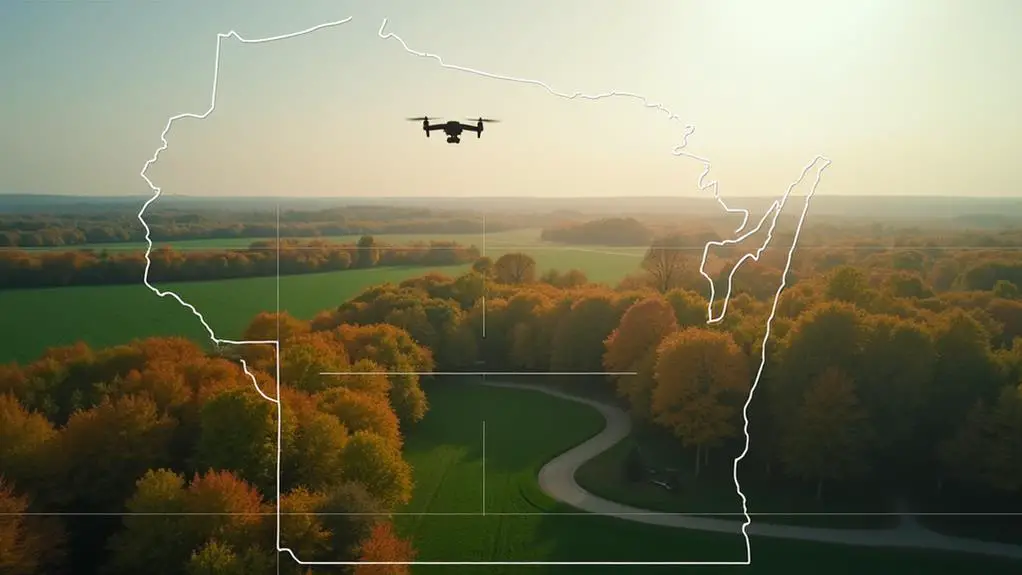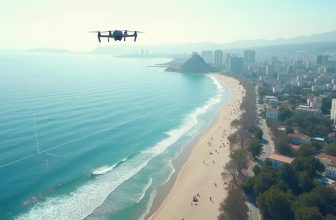
Imagine standing in a picturesque Wisconsin landscape, with a drone hovering above, capturing breathtaking views of the rolling hills and serene lakes. As a drone operator in this beautiful state, you're likely enthusiastic to take to the skies, but first, vital to understand the laws that govern drone usage. Wisconsin has a set of rules and regulations in place to guarantee safe and responsible flying. But, do you know what's required of you as a recreational or commercial drone operator? The consequences of non-compliance can be severe, so vital to know the specifics – especially when it comes to registration, licensing, and no-fly zones.
Contents
Key Takeaways
- In Wisconsin, drones weighing over 0.55 pounds must be registered with the FAA and labeled with a unique registration number.
- Wisconsin drone operators must maintain flight safety, follow drone etiquette, and keep drones in sight at all times.
- Drones are prohibited in Wisconsin's national parks, military bases, airports, and state prisons, among other no-fly zones.
- Operating a drone over private property without consent is prohibited in Wisconsin, and property surveillance is also restricted.
- Non-compliance with Wisconsin drone laws can result in fines of up to $2,500, penalties, and confiscation of equipment.
Recreational Drone Operator Laws
Before operating a recreational drone in Wisconsin, you must understand the laws and regulations that govern its use.
As a recreational drone operator, you're required to register your drone with the Federal Aviation Administration (FAA) if it weighs more than 0.55 pounds and less than 55 pounds. You must also label your drone with your registration number.
It's essential to follow drone etiquette and maintain flight safety.
You must keep your drone in sight at all times and not fly it higher than 400 feet above ground level.
You're also prohibited from flying your drone over people or in populated areas, such as stadiums, national parks, or near emergency response efforts.
Additionally, you must respect private property and obtain permission from the landowner before flying over their property.
You're also required to yield to manned aircraft and other drones.
Commercial Drone Operator Regulations
As a commercial drone operator in Wisconsin, you must obtain the necessary licensing and certification to operate your drone for business purposes.
You'll need to pass the Federal Aviation Administration's (FAA) Part 107 exam, which covers topics such as airspace, weather, and aircraft performance.
Additionally, you must also be aware of the right-of-way rules that govern drone operations, particularly in shared airspace with manned aircraft.
Licensing and Certification
To operate a commercial drone in Wisconsin, you'll need to comply with the Federal Aviation Administration's (FAA) licensing and certification requirements. As a commercial drone operator, you must obtain a remote pilot certificate with a small unmanned aircraft systems (sUAS) rating.
The FAA requires you to be at least 16 years old and able to read, speak, write, and understand English to apply for the remote pilot certificate. You'll also need to pass a knowledge test and undergo a background check by the Transportation Security Administration (TSA).
| Requirement | Description | Cost |
|---|---|---|
| Remote Pilot Certificate | Obtain a sUAS rating to operate a commercial drone | $150 (knowledge test) |
| Pilot Training | Complete a training program approved by the FAA | $500-$1,000 |
| Drone Insurance | Obtain liability insurance to cover potential damages | $500-$2,000 (annual premium) |
It's essential to note that maintaining a remote pilot certificate requires periodic recurrent training and adhering to FAA regulations. Additionally, consider investing in drone insurance to protect yourself and your business from potential liabilities. By following these requirements, you can guarantee safe and compliant commercial drone operations in Wisconsin.
Right of Way
When flying a commercial drone in Wisconsin, you must yield to manned aircraft and follow strict right-of-way regulations to guarantee safe and compliant operations.
This is vital in maintaining effective airspace management and preventing potential hazards.
As a commercial drone operator in Wisconsin, understanding the right-of-way rules is paramount to avoid collisions and facilitate smooth operations.
- Yield to manned aircraft: Always give priority to manned aircraft, including airplanes, helicopters, and gliders.
- Maintain a safe distance: Keep a safe distance from obstacles, people, and other aircraft to prevent accidents.
- Be aware of emergency response: Be prepared to yield to emergency response aircraft, such as medical helicopters or firefighting planes.
- Follow airspace restrictions: Comply with airspace restrictions, including temporary flight restrictions (TFRs) and restricted airspace.
Drone Registration Requirements
Within Wisconsin, drone registration requirements are mandated by the Federal Aviation Administration (FAA), with some additional state regulations.
As a drone operator, you must register your unmanned aerial vehicle (UAV) if it weighs more than 0.55 pounds and less than 55 pounds. You'll need to register your drone online through the FAA's website and pay a $5 registration fee. You'll receive a unique registration number, which you must affix to your drone.
You'll also need to provide proof of registration when flying in public areas or when requested by law enforcement. Note that registration requirements apply to both recreational and commercial drone operators.
If you're using your drone for commercial purposes, such as aerial mapping or surveying, you may also need to obtain additional certifications, such as a Part 107 waiver. Additionally, consider investing in drone insurance to protect yourself against liability and damage.
Failure to comply with registration requirements can result in fines and penalties, so verify you understand and follow the regulations before taking to the skies.
No-Fly Zones in Wisconsin
Knowing the registration requirements for your drone in Wisconsin is just the first step in verifying compliance with local regulations.
Familiarizing yourself with no-fly zones in the state is equally vital to avoid any potential penalties or accidents. No-fly zones are areas where drone operations are restricted or prohibited due to safety or security concerns.
In Wisconsin, some of the no-fly zones include:
- National Parks: Drones are prohibited in all national parks, including Wisconsin's Apostle Islands and Saint Croix National Scenic Riverway, to protect the environment and wildlife.
- Military Bases: Drone operations are restricted in areas surrounding military bases, such as Volk Field Air National Guard Base and Fort McCoy, to safeguard national security.
- Airports: No-fly zones exist around airports, such as Milwaukee Mitchell International Airport and Dane County Regional Airport, to prevent interference with manned aircraft.
- State Prisons: Drones are prohibited near state prisons, such as Waupun Correctional Institution and Dodge Correctional Institution, to prevent smuggling and security breaches.
It is essential to check with local authorities or the Federal Aviation Administration (FAA) for specific no-fly zones and restrictions before operating your drone in Wisconsin.
Right to Privacy for Residents
How do Wisconsin's drone laws balance the privilege of operating drones with the right to privacy for residents? You should be aware that the state's drone laws are designed to safeguard the rights of residents while allowing drone operators to fly their devices.
Wisconsin's drone laws prohibit operating a drone over private property without the consent of the property owner.
This includes property surveillance, which can be considered an invasion of personal boundaries. You're required to obtain permission from the property owner before flying your drone over private property.
Additionally, Wisconsin's drone laws restrict flying drones over individuals in a manner that interferes with their personal space.
This means you should avoid flying your drone in a way that could be considered harassment or an invasion of personal boundaries. It's essential to respect the rights of others when operating your drone, guaranteeing that you don't compromise their right to privacy.
Penalties for Non-Compliance
In the event of non-compliance with Wisconsin's drone laws, you can expect to face penalties that reflect the severity of the infraction.
It's essential to understand that ignorance of the regulations isn't a valid defense, and you're expected to be aware of the fine print and any potential legal loopholes.
To avoid penalties, familiarize yourself with the regulations and verify you're operating within the bounds of the law.
Failure to do so may result in the following penalties:
- Fines: Up to $2,500 for each offense, depending on the severity of the infraction.
- Revocation of Permissions: Your permission to operate a drone in Wisconsin may be revoked, either temporarily or permanently.
- Confiscation of Equipment: In severe cases, your drone and associated equipment may be confiscated.
- Criminal Prosecution: Depending on the circumstances, you may face criminal prosecution, which could result in imprisonment.
It is vital to note that penalties may vary depending on the specific circumstances of the infraction.
Always confirm you're operating within the bounds of the law to avoid facing these penalties.
Frequently Asked Questions
Can I Fly a Drone Over a School in Wisconsin?
You should exercise caution when flying over schools due to privacy concerns and potential for aerial surveillance. In Wisconsin, you're likely restricted from doing so, as schools are often considered sensitive areas.
Are Drone Insurance Policies Mandatory in Wisconsin?
You're not required to have drone insurance policies, but it's highly recommended for liability protection. Consider investing in drone coverage to safeguard against potential accidents or damages, ensuring you're financially protected in case of unforeseen events.
Can I Use Drones for Wildlife Management Purposes?
You're the conductor of a high-tech orchestra, harmonizing technology and nature. For wildlife management, you can use drones for habitat monitoring and wildlife tracking, but guarantee adherence to FAA regulations and obtain necessary permits.
Can I Fly Drones Near Airports at Night?
You must comply with airport restrictions when flying drones near airports, especially during nighttime operations. Obtain prior authorization from the airport and adhere to specific FAA guidelines for safe and lawful night drone flights.
Can Minors Operate Drones Without Adult Supervision?
Fearlessly flying drones, you'll need to follow strict rules: minors can operate drones without adult supervision if they've completed drone training and obtained parental consent, meeting specific age and competency requirements.
Conclusion
Navigating Wisconsin's drone laws is like charting a course through uncharted skies. With registration requirements, no-fly zones, and commercial regulations in place, drone operators must be diligent in their compliance. Failure to do so can result in penalties that can ground even the most seasoned operator. By staying informed and up-to-date on the latest regulations, you can guarantee a smooth flight, avoiding turbulence and keeping your operations airborne.






